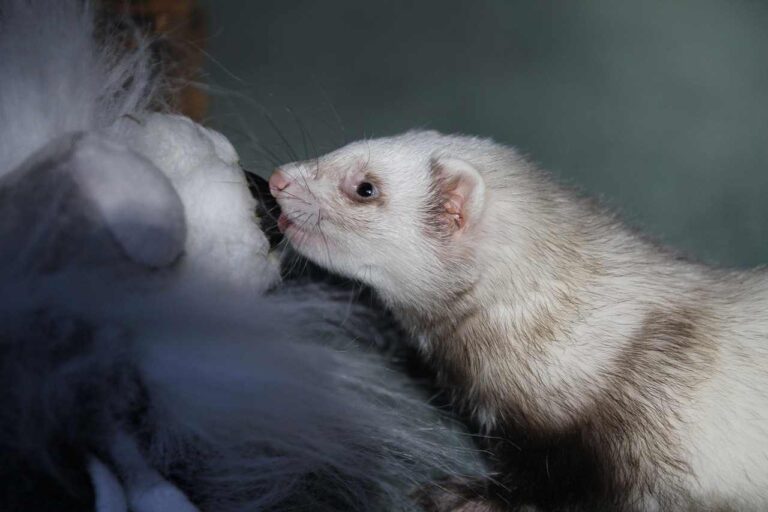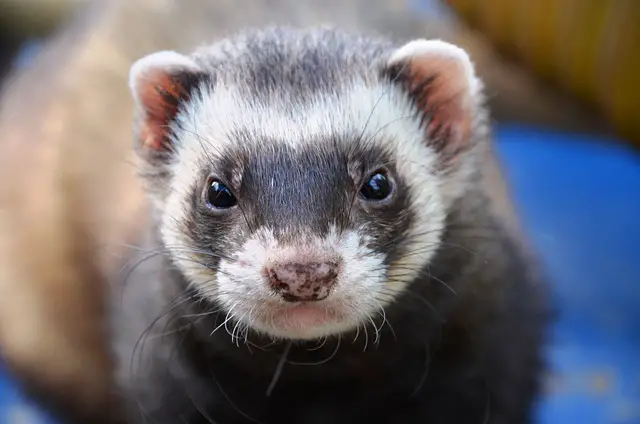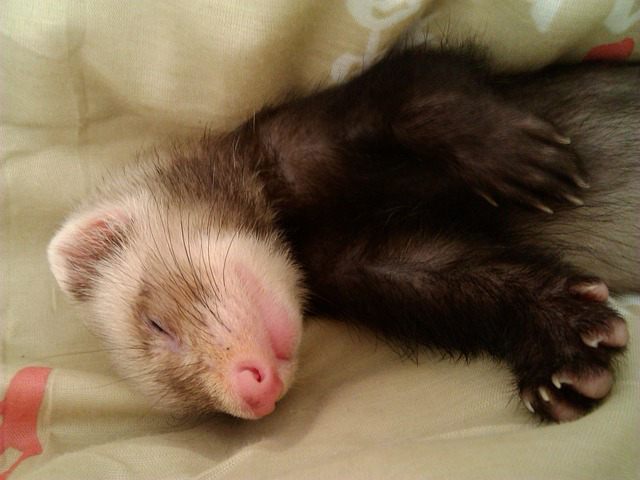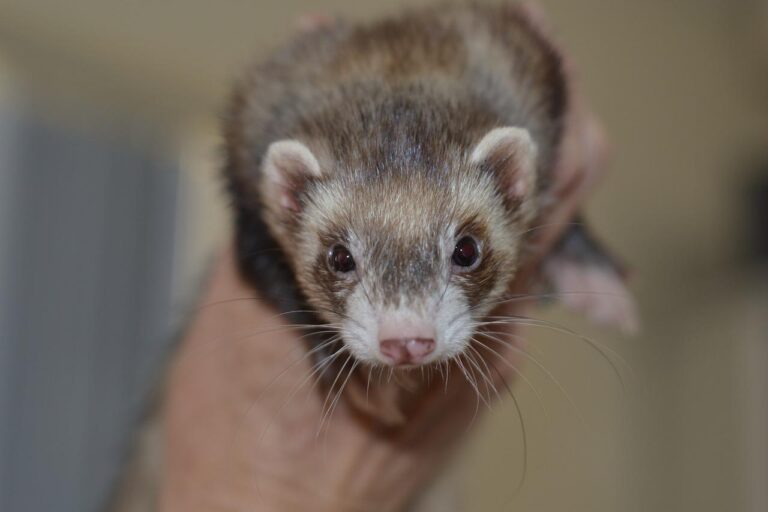Why Ferrets Bite [11 Reasons & Remedies]
![Why Ferrets Bite [11 Reasons & Remedies] Why Ferrets Bite](https://petcreeks.com/wp-content/uploads/2023/10/ferret-1972523_640.jpg)
Have you ever wondered why ferrets bite? Let’s find out together…
Today, in this blog post, we’re diving headfirst into the fascinating world of ferret behavior to uncover the reasons behind those unexpected nibbles.
Let’s get started…
Why Ferrets Bite
Ferrets may bite for various reasons, including teething, aggression, fear, playing, territorial behavior, and eating.
Ferrets use their mouths to communicate, play, and defend themselves.
Biting can also be a sign of a serious problem related to the ferret’s physical condition, its cage or household environment, or the relationship between the ferret and its owners.
It is important to understand the reason behind the biting behavior and address it accordingly, without resorting to physical punishment that can escalate the aggression.
Reasons Ferrets Bite
Here are some of the most common reasons ferrets bite:
1. Exploration and Playfulness
Ferrets are naturally curious and playful animals. They have a strong instinct to explore their surroundings, which often involves using their mouths to investigate objects and people.
When a ferret bites during exploration or play, it is usually not meant to be aggressive or harmful.
Instead, it’s their way of engaging with the world around them. However, their teeth are sharp, so even a playful bite can hurt.
It’s important to teach ferrets appropriate play behavior and redirect their biting onto appropriate toys or objects.
2. Teething Process
Like human babies, ferrets go through a teething process.
During this time, usually between the ages of three to six months, their teeth may be uncomfortable or itchy as new teeth emerge. Biting can be a way for them to alleviate the discomfort.
Providing appropriate chew toys specifically designed for ferrets can help redirect their biting behavior away from hands or other sensitive areas.
3. Lack of Socialization
Ferrets are social animals and require proper socialization from an early age.
If a ferret hasn’t been exposed to different people, animals, or environments during their critical socialization period, they may develop fear or anxiety, which can manifest as defensive biting.
It’s crucial to gradually introduce ferrets to new experiences, people, and animals in a positive and controlled manner.
This helps them become more comfortable and reduces the likelihood of defensive biting.
4. Attention-seeking
Ferrets are intelligent creatures and often seek attention from their owners.
If they feel ignored or neglected, they may resort to biting as a way to communicate their needs.
Sometimes, even negative attention, such as scolding, can reinforce this behavior.
It’s important to provide regular interaction, playtime, and mental stimulation for your ferret to prevent attention-seeking biting.
Positive reinforcement training can also help teach them alternative behaviors to get your attention.
5. Fear or Agitation
Ferrets, like many animals, have a fight-or-flight response when they feel threatened or scared.
If a ferret is afraid or agitated, it might bite as a defensive reaction.
This can happen when they are in a new environment, encountering unfamiliar people or animals, or feeling trapped or cornered.
It’s important to provide a calm and secure environment for ferrets to help reduce their fear and anxiety.
6. Territorial Behavior
Ferrets are known for being territorial animals. They can become protective of their living space, toys, or even their humans.
If they feel that their territory is being encroached upon, they may resort to biting as a way to assert their boundaries.
Providing separate spaces for multiple ferrets and ensuring they have plenty of enrichment and toys can help mitigate territorial behavior.
7. Pain or Discomfort
When ferrets are in pain or discomfort, they may bite as a response to being touched or handled.
This can happen if they are suffering from an injury, illness, or even dental problems.
It’s crucial to monitor the health of ferrets closely and seek veterinary care if any signs of pain or discomfort are observed.
Gentle handling and regular health check-ups can help prevent biting due to pain.
8. Overstimulation
Ferrets are naturally playful and energetic animals. However, they can become overstimulated during play, especially if they are engaging with their human companions.
Overstimulation can lead to rough play and nipping, as they may not realize that their play has become too intense.
Providing regular opportunities for exercise and play, along with monitoring their behavior for signs of overexcitement, can help prevent overstimulation-related biting.
9. Hormonal Changes
During hormonal changes such as puberty or mating season, ferrets can experience an increase in aggressive behavior due to the surge of hormones.
This can lead to a higher likelihood of biting as they navigate through these biological changes.
It’s important for ferret owners to understand and anticipate these periods, and take appropriate measures to manage their ferret’s behavior during these times.
Neutering or spaying ferrets can also help to mitigate hormonal fluctuations and reduce the likelihood of aggressive behavior.
10. Lack of Training
Ferrets, like any other pets, require proper training to understand boundaries and acceptable behavior.
Without adequate training, they may resort to biting as a way to communicate, play, or establish dominance.
Training should involve positive reinforcement techniques to encourage desired behavior and discourage biting.
Consistent and patient training can help ferrets learn appropriate social interactions and reduce the occurrence of biting incidents.
11. Unfamiliarity
Ferrets are naturally curious and inquisitive animals, but they can also be sensitive to unfamiliar environments, people, or other pets.
When placed in unfamiliar or stressful situations, ferrets may feel threatened and resort to biting as a defensive response.
It’s important for owners to introduce ferrets to new experiences gradually and provide a safe and secure environment to help them feel more at ease.
Building trust through positive interactions and socialization can help reduce their inclination to bite when faced with unfamiliar circumstances.
How to Deter a Ferret From Biting
Dealing with a ferret that likes to nip? No worries, I’ve got some quick tips for you.
First off, make sure to give your ferret plenty of toys and playtime to keep them occupied and less likely to bite.
Next, use a high-pitched “ouch” sound when they bite to let them know it hurts.
Then, gently scruff them (grab the loose skin on the back of their neck) and say “no” to communicate that biting is not okay.
Also, consider providing chew toys to redirect their biting behavior. Lastly, be patient and consistent with these techniques, and always reward good behavior with treats and praise.
With a little time and effort, you can help your ferret learn not to bite.
Learn more about training a ferret not to bite.
What to Do If Your Ferret Bites You
So, if your ferret decides to give you a little nibble, don’t worry, it happens.
First off, stay calm and try not to pull away quickly, as this can provoke more biting.
Instead, gently push your hand into the ferret’s mouth to encourage it to release its grip.
Then, give your ferret a time-out in its cage for a few minutes to help it understand that biting isn’t cool.
After that, you can try to figure out what caused the bite and work on preventing it in the future.
And of course, if the bite breaks the skin or causes any concerns, definitely seek medical attention.
Ferrets can be mischievous little critters, but with some patience and understanding, you can navigate through those nippy moments.
How to Treat Ferret Bite at Home
So, you’ve had a run-in with a feisty ferret, huh? Don’t worry, I’ve got some tips for treating that ferret bite at home.
First things first, wash the wound with soap and water to clean it out. Then, apply some antiseptic cream to help prevent infection.
Keep an eye on the bite for any signs of redness, swelling, or discharge, as these could indicate an infection. If you notice any of these signs, it’s best to seek medical attention.
Oh, and remember, ferret bites can be pretty nippy, so it’s a good idea to give your furry friend some space and maybe work on some training to prevent future nips.
Also, if you haven’t already, make sure your ferret is up to date on their vaccinations to reduce the risk of any complications from the bite. Take care, and give that ferret a gentle pat from me!
Frequently Asked Questions
Why do ferrets bite?
Ferrets may bite for various reasons. They might be scared, feel threatened, or simply be playing rough. It’s essential to understand your ferret’s behavior and provide proper training and socialization to minimize biting incidents.
How can I prevent my ferret from biting?
To prevent biting, spend time socializing your ferret from an early age. Provide positive reinforcement and gentle handling, gradually exposing them to different environments and people. Additionally, avoid rough play and always supervise interactions with children or other pets.
Read more about how ferrets show affection.
My ferret bites when I try to handle them. What should I do?
If your ferret displays biting behavior during handling, it’s crucial to address the underlying cause. Start by observing their body language and identifying triggers. Consult a veterinarian or a ferret behavior expert for guidance on how to modify their behavior and build trust.
Are all ferrets prone to biting?
Not all ferrets are prone to biting. However, some individual ferrets may have a more aggressive or fearful disposition, which can increase the likelihood of biting. Proper training, socialization, and understanding your ferret’s personality can help mitigate this behavior.
Can ferret biting be dangerous?
Ferret bites can be painful and potentially break the skin, leading to infections. Additionally, if left unaddressed, biting behavior can escalate and become a persistent problem. It’s essential to address biting behavior early on and seek professional advice if necessary.
Are there any medical reasons why a ferret might bite?
Yes, there are medical reasons why a ferret might bite. Pain, illness, or discomfort can cause a ferret to become defensive and bite. If your ferret’s biting behavior is sudden or unusual, it’s recommended to consult a veterinarian to rule out any underlying health issues.
Conclusion
In conclusion, understanding why ferrets bite is crucial for their owners. By recognizing their natural instincts and providing appropriate training and socialization, we can create a safe and harmonious bond with these playful creatures. So, let’s be patient, educate ourselves, and ensure a bite-free environment for our furry ferret friends!

![Ferret Whimpering [Causes & How To Respond] Ferret Whimpering](https://petcreeks.com/wp-content/uploads/2023/12/ferret-1970169_640.jpg)

![How Do I Know If My Ferret Is In Pain [See 11 Signs] How Do I Know If My Ferret Is In Pain](https://petcreeks.com/wp-content/uploads/2023/12/ferret-660546_1280-768x576.jpg)


